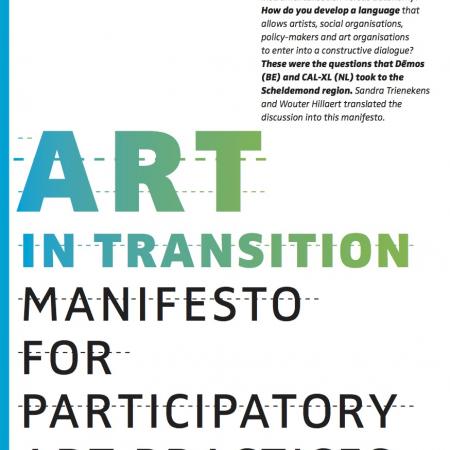dēmos is sinds 2025 deel van publiq vzw. We blijven maatschappelijke ontwikkelingen die de cultuur-, jeugdwerk- en sportsector vormgeven volgen en werken aan gelijke participatiekansen. We staan voor cultuur, jeugdwerk en sport die aansturen op maatschappelijke veranderingen en bouwen aan een meer open, inclusieve én democratische samenleving.
Art in transition. Manifesto for participatory art practices
item_left

item_right
Art in transition. Manifesto for participatory art practices
How do you discuss the power of participatory art practices for a society in transition, without getting caught up in typical contrasts such as artistic versus social, public versus private, instrumentalisation versus autonomy? How do you develop a language that allows artists, social organisations, policy-makers and art organisations to enter into a constructive dialogue? These were the questions that Demos (BE) and CAL-XL (NL) took to the Scheldemond region.
Sandra Trienekens and Wouter Hillaert translated the discussion into this manifesto. You can download it here.
What precisely are we talking about?
Participatory art practices are neither a passe-partout, nor a specific genre in a particular area. They can be found in both the established arts and cultural institutions as well as in socio-cultural work or community art. The art form, genre and artistic discipline may vary, but there are at least four recognisable characteristics that are required for art to be regarded as participatory art, as specified in this manifesto: contextual, artistic, participatory and transformative.
How can the arts intensify their connection with society?
The key question is not whether art can address and contribute to social challenges, but how and in what circumstances this contribution can make a difference. It is the ‘how’ in particular that causes tension. This question applies equally to individual artists, established art institutions and small participatory art organisations. The manifesto underlines a necessary collaborative partnership between artists, government, art organisations and care, welfare or other social organisations. Each with its own position and responsibility to strengthen participatory art.
Strategic alliances
This manifesto envisions a cultural landscape where participatory art practices are seen as a necessary and valued element of a society in transition and are being deployed widely. Participatory art practices will not turn complex social issues around on their own, but they can make a major contribution. Demos and CAL-XL are calling on artists, social organisations, policy-makers and art organisations to form local, lasting strategic alliances that jointly commission participatory art practices. Alliances that investigate how the number and quality of such practices can be increased and the support for them better developed in the years ahead.
About the authors
Wouter Hillaert is a freelance theatre critic for De Standaard, coordinates the cultural magazine rekto:verso and is a co-founder of Hart boven Hard.
Sandra Trienekens is a human geographer (MA) and cultural sociologist (PhD). She is founder of the Dutch research agency Urban Paradoxes.
The ‘Art in Transition’ programme has been facilitated by the ‘Scheldemondraad’, the permanent consultative platform of the provinces of East and West Flanders (B) and Zeeland (NL) and the municipalities in the Scheldemond ‘Euregio’ border area. By supporting this and other projects, the Scheldemondraad wishes to intensify the cross- border collaboration and to build bridges between the people of East and West Flanders and of Zeeland.
The Hague University of Applied Sciences, Faculty of Social Work & Education, has generously provided support for the translation of the manifesto into English.
colophon
A publication of Demos vzw & CAL-XL
Editor in charge: Dominique Nuyttens Demos vzw – Sainctelettesquare 19 B-1000 Brussel
Design: Mark Schalken, de Ruimte ontwerpers
isbn: 9789491938
ean: 9789491938047
September 2015
Free download underneath this page


